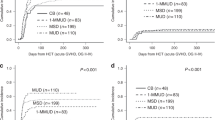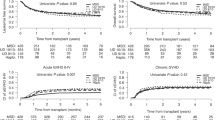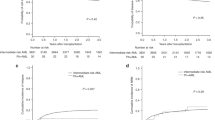Abstract
We analyzed long-term outcomes of myeloablative stem cell transplantation (SCT) in 292 adults with Philadelphia (Ph)-negative acute lymphoblastic leukemia (ALL). Donors were related (RD; n=132), unrelated (URD; n=68; 30 well-matched (WM), 19 partially matched (PM), 19 mismatched (MM)) and autologous (AUTO; n=92). After a median follow-up of 85 months, the risk of relapse was higher for AUTO-SCT than for RD-SCT (P<0.001). MM-URD-SCT yielded higher risk of non-relapse mortality than RD-SCT (P=0.010). As a result, disease-free survival (DFS) at 5 years was inferior using AUTO (46.1%; P=0.010) or MM-URD (26.3%; P=0.036), whereas DFS from other donor sources was approximately equivalent (53.5% for RD, 63.3% for WM-URD and 57.0% for PM-URD). Other factors associated with poorer DFS included SCT beyond first complete remission (CR), older age and adverse cytogenetics. In a pairwise comparison of outcomes between RD-SCT and AUTO-SCT for patients in first CR, the inferiority of AUTO-SCT was observed, particularly in high-risk patients. Conversely, in standard-risk patients, AUTO-SCT yielded comparable outcomes to RD-SCT. SCT using RD, WM-URD or PM-URD may be considered the best donor sources for adult high-risk Ph-negative ALL.
This is a preview of subscription content, access via your institution
Access options
Subscribe to this journal
Receive 12 print issues and online access
$259.00 per year
only $21.58 per issue
Buy this article
- Purchase on Springer Link
- Instant access to full article PDF
Prices may be subject to local taxes which are calculated during checkout




Similar content being viewed by others
References
Larson RA, Dodge RK, Linker CA, Stone RM, Powell BL, Lee EJ et al. A randomized controlled trial of filgrastim during remission induction and consolidation chemotherapy for adults with acute lymphoblastic leukemia: CALGB study 9111. Blood 1998; 92: 1556–1564.
Linker C, Damon L, Ries C, Navarro W . Intensified and shortened cyclical chemotherapy for adult acute lymphoblastic leukemia. J Clin Oncol 2002; 20: 2464–2471.
Annino L, Vegna ML, Camera A, Specchia G, Visani G, Fioritoni G et al. Treatment of adult acute lymphoblastic leukemia (ALL): long-term follow-up of the GIMEMA ALL 0288 randomized study. Blood 2002; 9: 863–871.
Takeuchi J, Kyo T, Naito K, Sao H, Takahashi M, Miyawaki S et al. Induction therapy by frequent administration of doxorubicin with four other drugs, followed by intensive consolidation and maintenance therapy for adult acute lymphoblastic leukemia: the JALSG-ALL93 study. Leukemia 2002; 16: 1259–1266.
Labar B, Suciu S, Zittoun R, Muus P, Marie JP, Fillet G et al. Allogeneic stem cell transplantation in acute lymphoblastic leukemia and non-Hodgkin's lymphoma for patients <or=50 years old in first complete remission: results of the EORTC ALL-3 trial. Haematologica 2004; 89: 809–817.
Kantarjian H, Thomas D, O'Brien S, Cortes J, Giles F, Jeha S et al. Long-term follow-up results of hyper-fractionated cyclophosphamide, vincristine, doxorubicin, and dexamethasone (Hyper-CVAD), a dose-intensive regimen, in adult acute lymphocytic leukemia. Cancer 2004; 101: 2788–2801.
Hunault M, Harousseau JL, Delain M, Truchan-Graczyk M, Cahn JY, Witz F et al. Better outcome of adult acute lymphoblastic leukemia after early genoidentical allogeneic bone marrow transplantation (BMT) than after late high-dose therapy and autologous BMT: a GOELAMS trial. Blood 2004; 104: 3028–3037.
Thomas X, Boiron JM, Huguet F, Dombret H, Bradstock K, Vey N et al. Outcome of treatment in adults with acute lymphoblastic leukemia: analysis of the LALA-94 trial. J Clin Oncol 2004; 22: 4075–4086.
Ribera JM, Oriol A, Bethencourt C, Parody R, Hernandez-Rivas JM, Moreno MJ et al. Comparison of intensive chemotherapy, allogeneic or autologous stem cell transplantation as post-remission treatment for adult patients with high-risk acute lymphoblastic leukemia. Results of the PETHEMA ALL-93 trial. Haematologica 2005; 90: 1346–1356.
Rowe JM, Buck G, Burnett AK, Chopra R, Wiernik PH, Richards SM et al. Induction therapy for adults with acute lymphoblastic leukemia: results of more than 1500 patients from the international ALL trial: MRC UKALL XII/ECOG E2993. Blood 2005; 106: 3760–3767.
Yanada M, Matsuo K, Suzuki T, Naoe T . Allogeneic hematopoietic stem cell transplantation as part of postremission therapy improves survival for adult patients with high-risk acute lymphoblastic leukemia: a metaanalysis. Cancer 2006; 106: 2657–2663.
Goldstone AH, Richards SM, Lazarus HM, Tallman MS, Buck G, Fielding AK et al. In adults with standard-risk acute lymphoblastic leukemia, the greatest benefit is achieved from a matched sibling allogeneic transplantation in first complete remission, and an autologous transplantation is less effective than conventional consolidation/maintenance chemotherapy in all patients: final results of the International ALL Trial (MRC UKALL XII/ECOG E2993). Blood 2008; 111: 1827–1833.
Cornelissen JJ, van der Holt B, Verhoef GE, van't Veer MB, van Oers MH, Schouten HC et al. Myeloablative allogeneic versus autologous stem cell transplantation in adult patients with acute lymphoblastic leukemia in first remission: a prospective sibling donor versus no-donor comparison. Blood 2009; 113: 1375–1382.
Thomas DA, Faderl S, Cortes J, O'Brien S, Giles FJ, Kornblau SM et al. Treatment of Philadelphia chromosome-positive acute lymphocytic leukemia with hyper-CVAD and imatinib mesylate. Blood 2004; 103: 4396–4407.
Yanada M, Takeuchi J, Sugiura I, Akiyama H, Usui N, Yagasaki F et al. High complete remission rate and promising outcome by combination of imatinib and chemotherapy for newly diagnosed BCR-ABL-positive acute lymphoblastic leukemia: a phase II study by the Japan Adult Leukemia Study Group. J Clin Oncol 2006; 24: 460–466.
Wassmann B, Pfeifer H, Goekbuget N, Beelen DW, Beck J, Stelljes M et al. Alternating versus concurrent schedules of imatinib and chemotherapy as front-line therapy for Philadelphia-positive acute lymphoblastic leukemia (Ph+ ALL). Blood 2006; 108: 1469–1477.
de Labarthe A, Rousselot P, Huguet-Rigal F, Delabesse E, Witz F, Maury S et al. Imatinib combined with induction or consolidation chemotherapy in patients with de novo Philadelphia chromosome-positive acute lymphoblastic leukemia: results of the GRAAPH-2003 study. Blood 2007; 109: 1408–1413.
Lee S, Kim YJ, Min CK, Kim HJ, Eom KS, Kim DW et al. The effect of first-line imatinib interim therapy on the outcome of allogeneic stem cell transplantation in adults with newly diagnosed Philadelphia chromosome-positive acute lymphoblastic leukemia. Blood 2005; 105: 3449–3457.
Lee S, Kim YJ, Chung NG, Lim J, Lee DG, Kim HJ et al. The extent of minimal residual disease reduction after the first 4-week imatinib therapy determines outcome of allogeneic stem cell transplantation in adults with Philadelphia chromosome-positive acute lymphoblastic leukemia. Cancer 2009; 115: 561–570.
Kiehl MG, Kraut L, Schwerdtfeger R, Hertenstein B, Remberger M, Kroeger N et al. Outcome of allogeneic hematopoietic stem-cell transplantation in adult patients with acute lymphoblastic leukemia: no difference in related compared with unrelated transplant in first complete remission. J Clin Oncol 2004; 22: 2816–2825.
Dahlke J, Kroger N, Zabelina T, Ayuk F, Fehse N, Wolschke C et al. Comparable results in patients with acute lymphoblastic leukemia after related and unrelated stem cell transplantation. Bone Marrow Transplant 2006; 37: 155–163.
Bachanova V, Weisdorf D . Unrelated donor allogeneic transplantation for adult acute lymphoblastic leukemia: a review. Bone Marrow Transplant 2008; 41: 455–464.
Marks DI, Perez WS, He W, Zhang MJ, Bishop MR, Bolwell BJ et al. Unrelated donor transplants in adults with Philadelphia-negative acute lymphoblastic leukemia in first complete remission. Blood 2008; 112: 426–434.
Lee S, Cho BS, Kim SY, Choi SM, Lee DG, Eom KS et al. Allogeneic stem cell transplantation in first complete remission enhances graft-versus-leukemia effect in adults with acute lymphoblastic leukemia: antileukemic activity of chronic graft-versus-host disease. Biol Blood Marrow Transplant 2007; 13: 1083–1094.
Weisdorf D, Spellman S, Haagenson M, Horowitz M, Lee S, Anasetti C et al. Classification of HLA-matching for retrospective analysis of unrelated donor transplantation: revised definitions to predict survival. Biol Blood Marrow Transplant 2008; 14: 748–758.
Cho BS, Lee S, Kim YJ, Chung NG, Eom KS, Kim HJ et al. Reduced-intensity conditioning allogeneic stem cell transplantation is a potential therapeutic approach for adults with high-risk acute lymphoblastic leukemia in remission: results of a prospective phase 2 study. Leukemia 2009; 23: 1763–1770.
Moorman AV, Harrison CJ, Buck GA, Richards SM, Secker-Walker LM, Martineau M et al. Karyotype is an independent prognostic factor in adult acute lymphoblastic leukemia (ALL): analysis of cytogenetic data from patients treated on the Medical Research Council (MRC) UKALLXII/Eastern Cooperative Oncology Group (ECOG) 2993 trial. Blood 2007; 109: 3189–3197.
Pullarkat V, Slovak ML, Kopecky KJ, Forman SJ, Appelbaum FR . Impact of cytogenetics on the outcome of adult acute lymphoblastic leukemia: results of Southwest Oncology Group 9400 study. Blood 2008; 111: 2563–2572.
Przepiorka D, Weisdorf D, Martin P, Klingemann HG, Beatty P, Hows J et al. 1994 Consensus Conference on Acute GVHD Grading. Bone Marrow Transplant 1995; 15: 825–828.
Lee SJ, Vogelsang G, Flowers ME . Chronic graft-versus-host disease. Biol Blood Marrow Transplant 2003; 9: 215–233.
Klein JP, Rizzo JD, Zhang MJ, Keiding N . Statistical methods for the analysis and presentation of the results of bone marrow transplants. Part 2: Regression modeling. Bone Marrow Transplant 2001; 28: 1001–1011.
Klein JP, Rizzo JD, Zhang MJ, Keiding N . Statistical methods for the analysis and presentation of the results of bone marrow transplants. Part I: Unadjusted analysis. Bone Marrow Transplant 2001; 28: 909–915.
Gray RJ . A class of K-sample tests for comparing the cumulative incidence of a competing risk. Ann Stat 1988; 16: 1141–1154.
Tomblyn MB, Arora M, Baker KS, Blazar BR, Brunstein CG, Burns LJ et al. Myeloablative hematopoietic cell transplantation for acute lymphoblastic leukemia: analysis of graft sources and long-term outcome. J Clin Oncol 2009; 27: 3634–3641.
Thiebaut A, Vernat JP, Degos L, Huguet FR, Reiffers J, Sebban C et al. Adult acute lymphoblastic leukemia study testing chemotherapy and autologous and allogeneic transplantation. A follow-up report of the French protocol LALA 87. Hematol Oncol Clin North Am 2000; 14: 1353–1366.
Powles R, Sirohi B, Treleaven J, Kulkarni S, Tait D, Singhal S et al. The role of posttransplantation maintenance chemotherapy in improving the outcome of autotransplantation in adult acute lymphoblastic leukemia. Blood 2002; 100: 1641–1647.
Mehta J, Powles R, Sirohi B, Treleaven J, Kulkarni S, Tait D et al. High-dose melphalan and autotransplantation followed by post transplant maintenance chemotherapy for acute lymphoblastic leukemia in first remission. Bone Marrow Transplant 2004; 33: 1107–1114.
Yakoub-Agha I, Mesnil F, Kuentz M, Boiron JM, Ifrah N, Milpied N et al. Allogeneic marrow stem-cell transplantation from human leukocyte antigen-identical siblings versus human leukocyte antigen-allelic-matched unrelated donors (10/10) in patients with standard-risk hematologic malignancy: a prospective study from the French Society of Bone Marrow Transplantation and Cell Therapy. J Clin Oncol 2006; 24: 5695–5702.
Acknowledgements
We acknowledge the financial support of the Industry-Academic Cooperation Research Foundation made in the program year of 2009. Statistical analyses performed in this article were advised by the Catholic Medical Center Clinical Research Coordinating Center.
Author information
Authors and Affiliations
Corresponding author
Ethics declarations
Competing interests
The authors declare no conflict of interest.
Rights and permissions
About this article
Cite this article
Lee, S., Chung, NG., Cho, BS. et al. Donor-specific differences in long-term outcomes of myeloablative transplantation in adults with Philadelphia-negative acute lymphoblastic leukemia. Leukemia 24, 2110–2119 (2010). https://doi.org/10.1038/leu.2010.217
Received:
Revised:
Accepted:
Published:
Issue Date:
DOI: https://doi.org/10.1038/leu.2010.217
Keywords
This article is cited by
-
CDKN2B downregulation and other genetic characteristics in T-acute lymphoblastic leukemia
Experimental & Molecular Medicine (2019)
-
Favorable outcome of haploidentical hematopoietic stem cell transplantation in Philadelphia chromosome-positive acute lymphoblastic leukemia: a multicenter study in Southwest China
Journal of Hematology & Oncology (2015)
-
Impact of IKZF1 deletions on long-term outcomes of allo-SCT following imatinib-based chemotherapy in adult Philadelphia chromosome-positive ALL
Bone Marrow Transplantation (2015)
-
Haploidentical hematopoietic SCT may be superior to conventional consolidation/maintenance chemotherapy as post-remission therapy for high-risk adult ALL
Bone Marrow Transplantation (2015)
-
Comparison of outcomes after single or double cord blood transplantation in adults with acute leukemia using different types of myeloablative conditioning regimen, a retrospective study on behalf of Eurocord and the Acute Leukemia Working Party of EBMT
Leukemia (2014)



